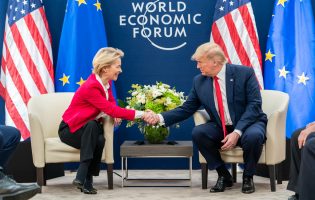The Rise of China: Implications for the Transatlantic Relationship
On Thursday, April 26, 2012, the American-German Institute hosted a seminar with Mr. Alexander Wolf, DAAD/AGI Fellow. In the seminar, Mr. Wolf discussed the implications of China’s rise as a global economic and political power on the role of the transatlantic alliance in a world characterized by increasingly complex and interconnected challenges. Mr. Wolf argued that because China remains unwilling to take on the role of a “responsible stakeholder” in the global system, the United States and Europe will need to continue to cooperate closely on economic and security issues in order to ensure global stability.
Mr. Wolf began his talk by describing the current status of the U.S.-European partnership, placing the attitudes and priorities in the context of an increasingly globalized world in which neither partner can unilaterally ensure global stability. However, as the need for international cooperation to address transnational challenges has increased, the partners appear to have prioritized China rather than look for ways to deepen transatlantic cooperation. This shift reflects China’s status as the preferred partner stakeholder in the international community for both the United States and Europe, resulting from its positive growth trajectory and increasing international influence.
However, according to Mr. Wolf, Chinese interests do not align with those of the United States and Europe. Although both powers may prefer to work with China as a “responsible stakeholder” in the liberal international system, China is unwilling to play a leadership role in upholding a system which it does not fully embrace. Instead, China has restricted its global agenda to the sustenance of the international business environment in order to protect its business interests abroad. Meanwhile, U.S. and European policymakers remain unable to develop a coordinated and consistent approach toward China. On the one hand, they have persistently encouraged China to act as a “responsible stakeholder” in addressing global conflicts and crises. On the other hand, they fear that China’s resurgence threatens their global power, and have acted to limit China’s political rise when it comes at their expense.
Nevertheless, China’s resurgence marks the definitive end of the “unipolar moment.” In a globalized world in which no power can respond effectively on a unilateral basis, superpower status does not mean as much as it used to. States must work together multilaterally in order to ensure global stability. Because China is not willing to take on a leadership role in upholding the liberal world order, the United States and Europe have no choice but to maintain their partnership as leaders in addressing arising conflicts and crises.
In order to increase the effectiveness of the transatlantic partnership, Mr. Wolf recommended that the United States and Europe develop a division of labor: Europe should act as a leader in addressing problems in neighboring regions including Eastern Europe, the Middle East, and North Africa while the United States, with its greater capacity to project power, should serve as a balancing power in East Asia. Furthermore, the powers should increase the capacities of their shared security institutions, considering a more global role for NATO and building a stronger common security institution within the European Union. The powers should also deepen economic cooperation and coordination in order to balance continued Chinese protectionism. Similarly, the transatlantic partners must coordinate their responses to China’s upcoming market economy status in the WTO.
Mr. Alexander Wolf is currently a DAAD Fellow at AGI and a PhD candidate at the University of the Armed Forces Munich with a doctoral scholarship from the Hanns Seidel Foundation. From 2005 to 2009 Mr. Wolf studied Political Sciences, Public Law, and Political Economy at Ludwig-Maximilians-University Munich, where he earned his Political Science Master’s degree in 2009. He has published and co-edited a number of books, articles, and book chapters on international security issues.







